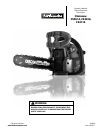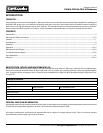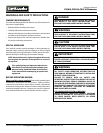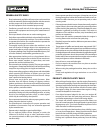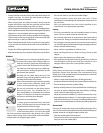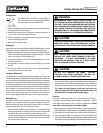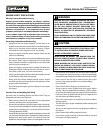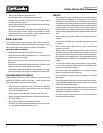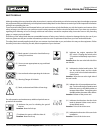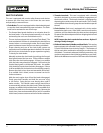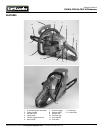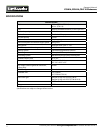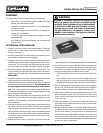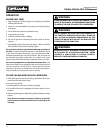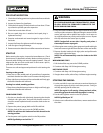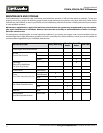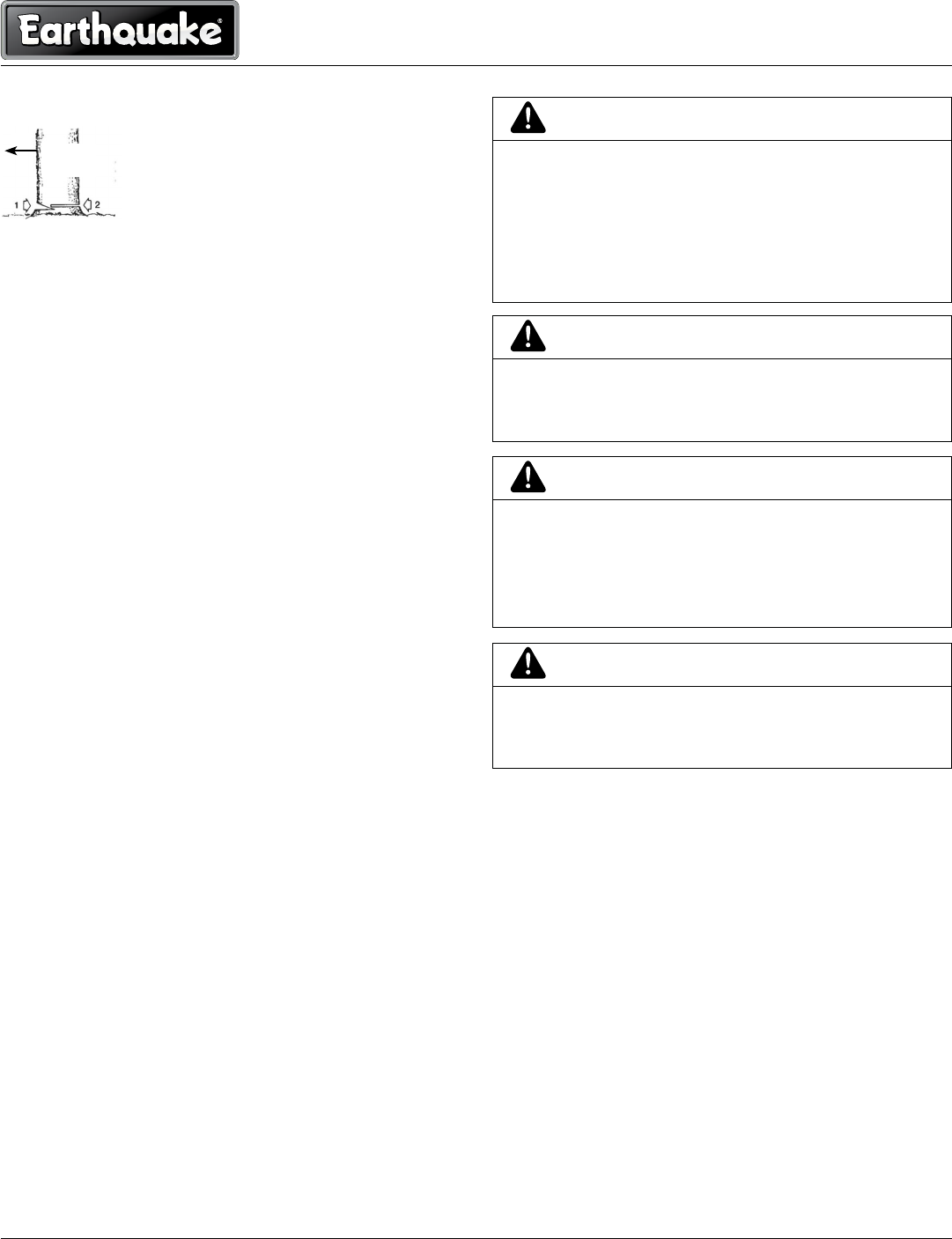
Check for parts online at www.getearthquake.com or call 800-345-6007 M-F 8-5
6
Operator's Manual
CS3814, CS3816, CS4116 Chainsaws
Felling Notch
The felling notch is the rst cut when felling a
tree. The notch will act as a hinge and will direct
the tree to fall in the desired direction.
1) Begin the felling notch by lining up the guide bar perpendicular
to the desired felling direction.
2) Make a downward cut at 45-degress to a depth of about 1/5
to 1/4 of the overall diameter of the tree.
3) Finish the notch by making a horizontal cut perpendicular to
the desired felling direction.
4) Remove the resultant piece.
Felling Cut
Alert others in the area of imminent danger of the falling tree. Double
check that no one has entered the area in the felling direction.
1) Begin the felling cut by making a horizontal cut perpendicular
to the intended felling direction and approximately 1-2 inches
above the bottom of the felling notch.
2) Leave approximately 1/10 of the tree’s diameter uncut. This
will form the hinge.
3) Drive plastic or wooden wedges into the felling cut to control
the fall.
4) As the tree begins to fall, alert others and immediately
evacuate the area around the tree.
Limbing a Felled Tree
“Limbing”referstoremovingthelimbsfromafallentree.Thereisan
extremely high danger of kickback during the limbing operation. Do
not work with the nose of the guide bar, as this could cause a kickback.
Use extreme caution and avoid contact between the nose of the bar
and the log or other limbs. Do not stand on the log while limbing it as
the log may roll as limbs are removed and the center of gravity shifts.
Start limbing by removing limbs from the top side of the log,
leaving limbs on the bottom to support the log up o the ground.
Limbs under tension may pinch the guide bar and saw chain.
Shut o the engine and lift the limb to remove the bar safely.
WARNING
INEXPERIENCED USERS SHOULD NEVER ATTEMPT TO
CUT TREES WITH ROTTEN HEARTWOOD THE CORE OF
THE TREE. THERE IS AN INCREASED RISK THAT THE TREE
COULD SNAP OR SPLIT UNEXPECTEDLY DURING THE CUT.
ALSO CHECK FOR DEAD OR ROTTEN LIMBS PRIOR TO
BEGINNING THE CUT. DEAD LIMBS CAN VIBRATE LOOSE
FROM THE TREE AND FALL, STRIKING THE OPERATOR.
CAUTION
ONLY TRAINED AND EXPERIENCED PROFESSIONALS
SHOULD FELL TREES NEAR OVERHEAD LINES AND
BUILDINGS. A SLIGHT MISJUDGMENT OF WIND
DIRECTION OR NATURAL LEAN OF A TREE COULD
RESULT IN MAJOR PROPERTY DAMAGE.
CAUTION
DO NOT CUT THROUGH THE HINGE. CUTTING
THROUGH THE HINGE INCREASES THE RISK OF
LOSING CONTROL OF THE FELLING DIRECTION.
CAUTION
LOGS AND LIMBS UNDER TENSION CAN SPRING BACK
WHEN CUT LOOSE. THIS LIGHTNING FAST ACTION
COULD CAUSE A LOSS OF CONTROL OF THE CHAINSAW.
Bucking a Log
“Bucking”isthecross-cutoperationofcuttingalogintousable
sections. Do not stand on the log while bucking as it may roll.
When bucking on a slope, stand uphill of the log in case it begins
to roll unexpectedly. Cut only one log at a time.
• Whenbuckingsmalllogs,placethemina“V”shapedbucking
horse to keep them at a working level. Never allow a bystander
to hold the log. Never hold the log with your leg or foot.
• Tobuckalogonatground,makeperpendicularcutsthrough
about half of the diameter of the log. Roll the log and nish
the cuts from the other side.
• Tobuckapillowedorsupportedlog,alwaysmakearelievingcut
through about 1/3 the diameter of the log from the compressed
side. Finish with a bucking cut from the tension side of the log.
Tip: When cutting firewood, make sure you know the
optimum length of the nished rewood ahead of time. Use
the guide bar as an approximate length gauge.
Pruning
Pruning is removing limbs from a standing tree, often for
purposes of maintaining a tree’s health or aesthetics. Always
work with a rm footing. Never cut from a stepladder. Do not
over reach. Do not cut above shoulder height.
1) Begin pruning by making a relief cut about 3 inches away from the
trunk of the tree to a depth of about 1/3 the diameter of the branch.
2) Complete the cut from above, just inside of the initial relief cut.
3) Finish pruning by making a smooth even cut nearly ush to the
trunk. It is recommended to only prune trees while they are dormant
in the fall and winter to reduce the risk posed by disease or insects.
direction
of fall



